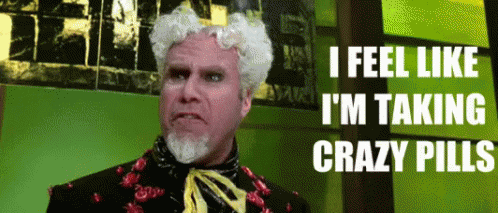Crazy Pills
“It's not denial. I'm just selective about the reality I accept.” – Bill Watterson
In the brilliantly funny 2001 film Zoolander, Ben Stiller plays a past-his-prime male model named Derek Zoolander. As the plot unfolds, Zoolander is unknowingly groomed and brainwashed by evil fashion designer Jacobim Mugatu (played by Will Ferrell) to assassinate the newly elected prime minister of Malaysia. The prime minister campaigned on a platform of raising the country’s minimum wage and ending child labor – thereby threatening the profitability of the fashion industry – and must be eliminated. Mugatu judges Zoolander to be just dim-witted enough for the task.
The movie is absurd and yet so well executed that it works. The sheer number of derivative memes you can find on Reddit and in the Twitterverse pay tribute to its many memorable scenes. One meme stands out from the rest and serves as an apt expression of the spectacle we’re scratching our feathers over today. Zoolander proclaims to have developed three signature looks: “Ferrari,” “Blue Steel,” and “Le Tigre.” GQ astutely describes them as being completely identical, with “a raised brow, pursed lips and the misguided confidence that everyone knows the difference between them.” After observing the crowd’s adoring reaction to Zoolander’s latest flash of Blue Steel on the runway an exasperated Mugatu explodes, “They’re all the same face! Doesn’t anyone notice this?! I feel like I’m taking crazy pills!!!”
We sympathize with Mugatu’s lament, observing our political class translate its deep misunderstanding of energy into an equally haphazard set of economic sanctions levied against Russia, totally unaware that they are expressing the same ridiculous face at every opportunity. Before proceeding, we should note that pointing out the flaws in the West’s war response is not “pro-Putin,” nor is it “unpatriotic” as some propagandists on Twitter would have you believe. It is the opposite. Until we collectively understand how Putin gained powerful leverage over us and why our economic response is not only destined to fail but also likely to backfire, we cannot craft a better path forward.
For evidence that our current strategy is more Blue Steel than brilliant, we turn to the chart of the Russian Ruble. Despite having precedent-setting sanctions imposed upon everything Russian – companies, people, assets – the Ruble has strengthened against the dollar compared to the pre-war period. The Central Bank of Russia recently cut interest rates for the third time since initially raising them to 20% early in the war. Here’s how the New York Times describes it (emphasis added throughout):
“Russia’s central bank slashed its benchmark interest rate to 11 percent, from 14 percent, in a hastily arranged meeting on Thursday as policymakers sought to support businesses and households struggling under sanctions.
The bank is cutting interest rates faster than expected as the country’s currency has rapidly appreciated, reaching its strongest level in four years against the U.S. dollar this week.
Capital controls imposed by the central bank after Russia’s invasion of Ukraine, particularly those forcing exporters to exchange their earnings into rubles, have increased demand for the Russian currency. The country’s large current account surplus, a measure of trade and investment flows, has been bolstered by high earnings from oil and gas exports and a drop in imports, is also keeping the ruble elevated.”
Two weeks ago, we held our inaugural Doom Zoom webinar with members of our Doomberg Pro tier. The presentation was titled “A Unified Theory of Doom: Life, Energy, and Currency” and was followed by a vibrant Q&A session that lasted nearly an hour. At that event, we argued that currency reserves are – in the most literal sense possible – claims on future energy.
Energy is life, standards of living are dictated by access to energy, and these two facts are the undeniable conclusions of the laws of physics. Since all humans everywhere strive for a higher standard of living, energy is the real money. In that context, the purpose of a currency is to organize our energy transactions in a way that efficiently and (hopefully) equitably shares our collective energy bounty. During times of primary energy abundance, countries geared more towards value-added work tend to see their currencies appreciate. During times of energy scarcity, countries that produce excess primary energy have the advantage. We are experiencing a period of energy scarcity today.
With this framework at the ready, let’s analyze why the behavior of today’s political Zoolanders is actually helping Putin instead of constraining him.



